- Last week, Netflix, Abbvie and Intel all surprised to the upside
- This week, Tech earnings are in focus
- MCD, AMD, BA, BABA, AAPL, AMZN, FB, GOOG, MSFT, all report during the course of this week
There's a packed week ahead as this final season of 2017 earnings reports moves into high gear. Last week brought a few stellar calls which helped propel some stocks higher, including Netflix (NASDAQ:NFLX) which soared 25% on an unexpectedly robust beat. Biopharmaceutical company AbbVie (NYSE:ABBV) jumped 13% on Friday after raising its 2018 EPS guidance by almost a dollar, from $6.37 to $7.33. Intel (NASDAQ:INTC) was also among last week's biggest gainers, after its stock rose 10.5% on an earnings beat on Friday, as it reported $1.08 vs. the expected $0.86.
This week is perhaps this season's busiest, with tech behemoths such as Apple, Facebook (NASDAQ:FB), and Amazon (NASDAQ:AMZN) reporting. A full list of this coming week's earnings reports can be found via our earnings calendar.
Here are five earnings reports to watch during the week of January 29 to February 1:
Tuesday:
1. McDonald's
Reports Tuesday, January 30, before the Open
Revenue Expectation: $5.26B, EPS: $1.59
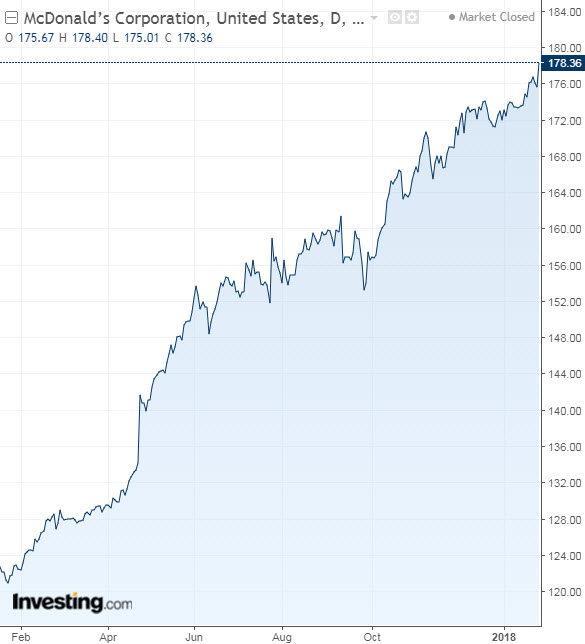
Over the past few years, McDonald’s (NYSE:MCD), the world's second largest fast food chain globally by number of locations, has been under a lot of scrutiny. The quality of Micky D's food was questioned; health concerns regarding the dangers of consuming too much fast food were raised; and consumers worried about the environmental impact of raising cattle for slaughter in conventional ways as well as disposal issues with plastic packaging.
Even though many investors originally bought McDonald's shares because of its dividend payout (current yield is 2.29%),the company has always found a way to brush aside analyst concerns regarding growth and continue appreciating in value. Last year McDonald's introduced hamburgers made from fresh meat rather than from frozen, added nutritional values to their packaging and recently vowed to have 100% of its packaging made from renewable or recycled sources. As well, the introduction of an all-day breakfast has had significant impact in 2017.
But all the focus the company has been putting into improving its image has caused McDonald's to lose ground to competitors on its value offering. McDonald's forfeited its place as the chain to go to if you have just a dollar in your pocket. With its new dollar menu, however, the company hopes to recapture this segment. We expect it to have a big impact on revenue in 2018. A positive update on McDonald's value segment in Q4 2017 from executives on the conference call could signal a strong year ahead for McDonald's.
2. Advanced Micro Devices
Reports Tuesday, January 30, after the Close
Revenue Expectation: $1.4B; EPS: $0.05
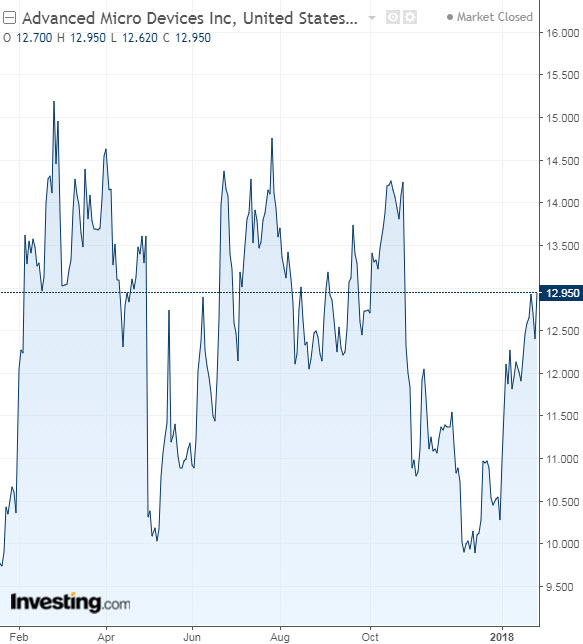
Advanced Micro Devices (NASDAQ:AMD) manufactures semiconductors and develops computer processors and related technologies. The most significant recent news for AMD had more to do with Intel (NASDAQ:INTC) than it did with AMD. On January 2, first reports of a security flaw in Intel processors hit the newswires. This issue is viewed as very serious; it could be exploited to access passwords and security keys.
Intel shares dropped hard—about 10% on the news. AMD as well as NVIDIA (NASDAQ:NVDA) jumped higher on the news, popping 7-10% each. Of course, it's too early to know exactly what the longer-term impact of this flaw will be. Will customers become more skeptical of Intel's processor in favor of AMD? AMD chips were affected by the same flaw, but to a much lesser degree.
With its strong pipeline beyond the flawed processors, including AMD's Ryzen desktop and mobile CPUs, as well as its Epyc data center CPUs, chip development shouldn't be a problem for the company. Still, AMD's challenge has never been its inability to promise and excite with new products. That's one of the company's strengths.
Rather, AMD stumbles more often when trying to transform the hype into real products in appropriate volume, thereby delivering on the bottom line. This will continue to be AMD's challenge moving into 2018.
Wednesday:
3. Boeing
Reports Wednesday, January 31, before the Open
Revenue Expectation: $24.74B; EPS: $2.91
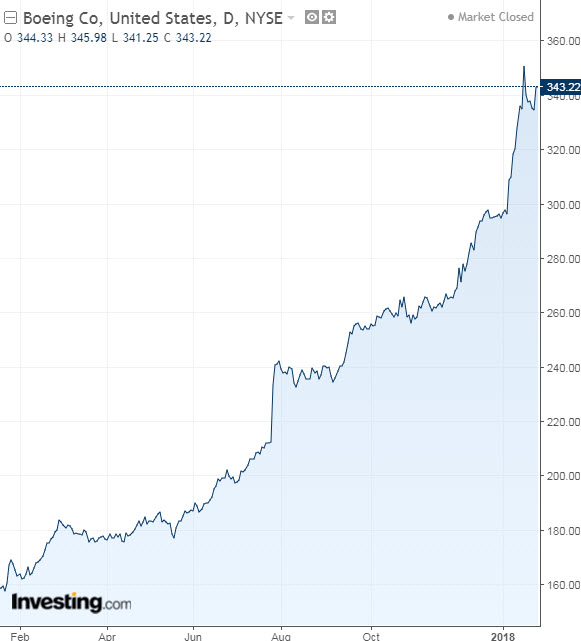
Boeing (NYSE:BA) designs, manufactures, and sells aircraft, rotorcraft, rockets, and satellites worldwide. In our best performing stocks of 2017 overview, we outlined why Boeing was 2017's number-one US stock performer; the reasons included the US government's tax cuts, investor expectations of more defense spending, and greater efficiency throughout the business. In 2017, competitor Airbus (OTC:EADSF) sold more aircraft than Boeing, 1109 versus Boeing's 912. However, when calculated in terms of US dollar revenue, Boeing actually came out on top, with order values totaling $67 billion to Airbus' $62 billion.
Today though, Boeing faces issues that are not business related but rather have much to do with the too high level of its valuation. Its P/E of 31 is extremely lofty for a manufacturing stock, which is essentially what Boeing is. We've already seen the stock top at $352, before falling to $343, where it closed on Friday. The key to Boeing's performance in 2018 will be related to management's guidance. Those numbers will have to be extremely impressive in order to justify the current valuation.
Thursday:
4. Alibaba
Reports Thursday, February 1, before the Open
Revenue Expectation: $12B, EPS: $1.65
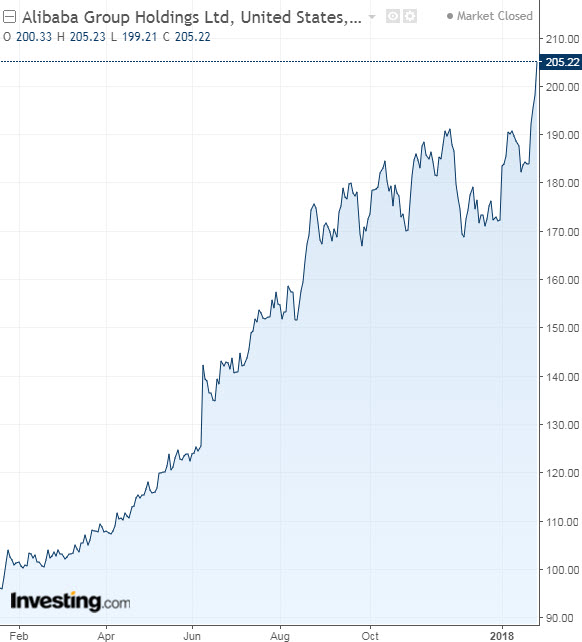
After an explosive first 10 months in 2017, when Alibaba's (NYSE:BABA) price per share skyrocketed from $89 to $190, during the past three months the company's stock has been trading sideways, dropping as low as $164 before regaining ground and breaking upward once again, to $205 at Friday's close, in anticipation of this week's quarterly report.
Alibaba's business as a Chinese e-commerce giant is going well. Its stock price is propelled by higher fundamentals, including top line growth of 50% and bottom line growth of 77% TTM compared to prior year's results. Asia is the home of the three best performing indices in the world over the past year, Vietnam's HNX 30, China's FTSE China A50, and Honk Kong's Hang Seng, which respectively gained 68%, 43%, and 43% in 2017. As Asian economies continue to grow, so will Alibaba.
The one looming threat is potential new trade policies from the Trump administration which could significantly hurt business between China and the US. Taobao, an Alibaba marketplace platform similar to eBay (NASDAQ:EBAY) or Amazon, was recently blacklisted, for a second time, by the US Trade Representative, for selling counterfeit goods. This tarnishes Alibaba's reputation and potentially affects sales outside of Asia. Nevertheless, Alibaba remains Asia's strongest e-commerce player, and as some have characterized the company, it's a gateway into Chinese commerce for global merchants. That alone can justify its valuation.
5. Apple
Reports Thursday, February 1, after the Close
Revenue Expectation: $85.80B, EPS: $3.77
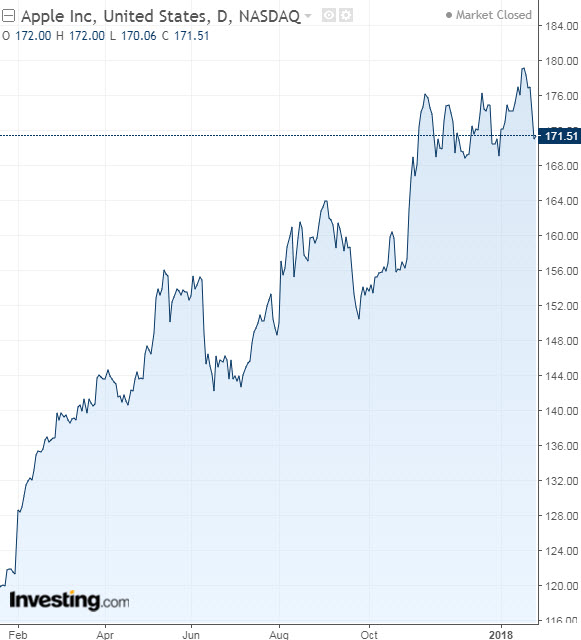
Apple's (NASDAQ:AAPL), quarterly report is bound to be interesting for two reasons: as the world's largest smartphone manufacturer, sales figures for its high-end iPhone X, which was launched in September, and the new repatriation tax, which incentivizes Apple to bring its overseas cash hoard back to the US are key metrics with which to gauge the company's recent and forward progress.
To begin with, there are concerns about iPhone X demand. With its steep price point, as well as two new, lesser iPhone iterations on the market—the 8 and 8 Plus, investors are worried that sales will disappoint. There are indications this could indeed be the case, including Apple suppliers expecting lower shipment volumes of high-end iPhone parts. Taiwan Semiconductor (NYSE:TSM), an important supplier, said it expected just such a drop in iPhone processor demand.
The other big item on the menu is the massive cash pile Apple is set to 'bring back' to the US. The money is already in the US and mostly in dollars, but is owned by Apple's Irish subsidiary. Apple itself has estimated it will have to pay around $38 billion in tax charges. Luckily the company has about $36.5 billion in deferred tax liabilities, which suggests they can cover most of this tax charge with no effect on earnings.
It's unlikely the market will react to a drop in earnings because of this one-time charge. If it does, we see a possible buying opportunity. As well, it's not uncommon for Apple to experience cyclical drops of 7-9%, only for the stock to resume its upward trajectory afterward. As for 2018, we fully expect big news such as acquisitions, branching out into new industries, or radical new R&D developments coming from Apple and its $250B in cash.
Other notable earnings this week include:
- Pfizer (NYSE:PFE), Tuesday, January 30, before the Open. Revenue Expectation: $13.67B, EPS: $0.56.
- Facebook (NASDAQ:FB), Wednesday, January 31, after the Close. Revenue Expectation: $12.56B, EPS: $1.94. We recently published a $225 target price for Facebook.
- Microsoft (NASDAQ:MSFT), Wednesday, January 31, after the Close. Revenue Expectation: $28.35B, EPS: $0.86.
- Amazon, Thursday, February 1, After the Close. Revenue Expectation: $59.98B, EPS: $1.85.
- Alphabet (NASDAQ:GOOGL), Thursday, February 1, after the Close. Revenue Expectation: $25.67B, EPS: $10.12.
